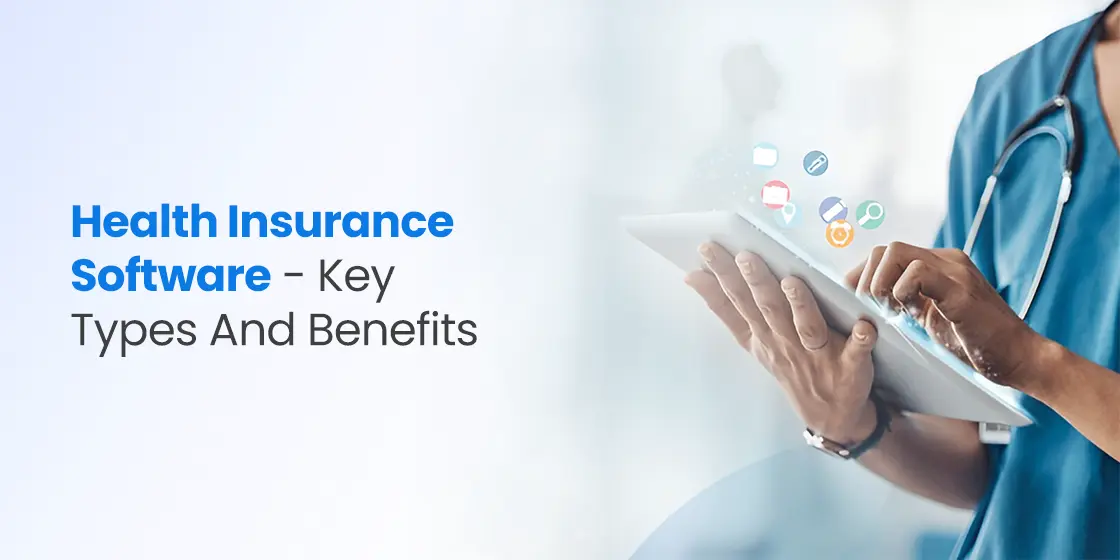Table of Content
Know Why Medical Institutions Need Advanced Health Insurance Software
In today’s digitally-driven healthcare landscape, health insurance software has emerged as a vital tool for insurers, providers, and patients alike. Designed by professional software development services to streamline administrative tasks, this software plays a key role in modernizing the way health insurance is managed. With increasing demand for efficient healthcare services and real-time data access, health insurance platforms offer the agility and automation that traditional methods simply cannot match.
The growing complexity of healthcare regulations and the rising need for data security have further fueled the popularity of health insurance software. From policy management to billing and customer services, these systems are equipped to handle everything with perfection. As a result, insurance companies can reduce operational costs, minimize errors, and offer faster, more transparent service to their members.
Moreover, the shift toward digital health and personalized care has driven insurers to adopt more advanced software solutions. Health insurance software enables better data analytics, allowing companies to tailor plans, forecast trends, and make more informed decisions. If you want to learn more about these software, as what type of utility and benefits it provide to the institutions, read this article in detail.
What is a Health Insurance Software?

Health insurance software is a specialized digital platform designed to assist insurance companies, healthcare providers, and administrators in managing all aspects of health insurance operations. This includes tasks such as policy creation, enrollment, claims processing, billing, underwriting, and customer service. By automating these functions, the software helps streamline complex administrative processes, reduce manual errors, and improve overall efficiency within the health insurance industry.
One of the core features of health insurance software is its ability to handle large volumes of data securely and accurately. It enables insurers to store and retrieve patient information, track claims status, calculate premiums, and ensure compliance with government regulations like HIPAA. Many systems also include tools for fraud detection, audit trails, and integration with third-party applications such as hospital management systems or electronic health records, creating a more connected and transparent healthcare ecosystem.
Beyond administrative functions, health insurance software also plays a significant role in enhancing the user experience. With self-service portals, and real-time communication tools, policyholders can easily manage their coverage, submit claims, and receive updates. Insurers benefit from analytics dashboards and reporting tools that provide insights into customer behavior, financial performance, and risk assessment—helping them make data-driven decisions and offer more personalized services.
Types of Health Insurance Software

There are different types of health insurance software available in the market. Before finalizing any health insurance app development, it is important to first understand the functionality of each software. Let’s take a look at them below.
Policy Management Software
Policy management software is designed to streamline the creation, updating, and administration of health insurance policies. It helps insurers manage policy lifecycles, including enrollment, renewals, coverage changes, and cancellations. By automating these processes, the software reduces manual workload, ensures regulatory compliance, and improves accuracy, allowing insurance providers to offer more efficient and responsive service to their customers.
Medical Claims Software
Medical claims software simplifies the submission, processing, and settlement of health insurance claims. It automates claims validation, adjudication, and payment procedures, reducing delays and minimizing the risk of errors or fraud. This software benefits both providers and policyholders by ensuring faster, more accurate reimbursements and streamlined claim tracking.
Partner with our software development specialists to pioneer custom solutions that drive your business forward.
Request Your Solution
Agent Management Software
Agent management software assists insurance companies in overseeing and supporting their network of sales agents. It tracks agent performance, manages commissions, facilitates training, and ensures licensing compliance. This type of software enhances communication between agents and insurers, optimizes sales workflows, and helps organizations maintain a productive and well-informed agent force.
Data Analysis Software
Data analysis software in the health insurance sector enables companies to extract insights from vast amounts of data, including claims history, customer behavior, and operational performance. By using advanced analytics and reporting tools, insurers can identify trends, assess risk, optimize pricing, and improve decision-making. This software plays a critical role in strategic planning and delivering more personalized, data-driven services to customers.
Benefits of Health Insurance Software

Health and hospital management software provides various types of benefits to the medical institutions. If you do not know much about them, take a look at the utilities offered by these software given below.
Improved Efficiency
Creating a health insurance management system allows organizations to significantly streamline their administrative processes. By digitizing operations such as policy handling, claims processing, and customer interactions, the system minimizes the need for physical documents and manual data entry. This not only enhances accuracy but also saves valuable time and resources that would otherwise be spent on routine clerical duties.
In addition to operational efficiency, a health insurance management system supports better organization and accessibility of data. Information that once required sorting through physical files can now be stored, retrieved, and updated digitally with ease. This level of automation not only simplifies daily workflows but also ensures quicker response times, and a more seamless experience for both insurers and policyholders.
Smooth Data Management
Healthcare insurance software is specifically designed to handle and organize vast volumes of data generated within the insurance and healthcare industries. The software provides a centralized digital platform where this data can be securely stored, efficiently processed, and easily accessed by authorized users. This level of organization is crucial for maintaining accurate records, ensuring timely responses, and reducing the risk of data loss or duplication.
Beyond storage and organization, the software also enhances data management through automation and intelligent processing tools. It can sort, analyze, and generate reports from complex datasets. Additionally, it supports compliance with data privacy laws by enforcing strict security protocols. This ability to manage large-scale information not only boosts operational efficiency but also supports strategic planning.
Better Customer Experience
Different types of healthcare software offer numerous benefits that significantly enhance the customer experience. With automated systems in place, policyholders can receive quicker responses to inquiries every time. This convenience builds trust and satisfaction by giving users more control and clarity over their insurance plans.
Additionally, health insurance software enables insurers to deliver more personalized services by analyzing customer data and usage patterns. This allows companies to tailor policies, send relevant updates, and proactively address customer needs. Overall, the use of health insurance software leads to a smoother customer experience, which is essential in today’s fast-paced, customer-driven environment.
Robust Data Analytics
Health insurance software is equipped with powerful data analysis and reporting tools that enable companies to gain deep insights into various aspects of their operations. These features allow insurers to systematically analyze market trends, and monitor the performance of different insurance products. By processing vast amounts of real-time data, the software helps organizations identify emerging demands, and develop more competitive offerings.
In addition to market analysis, the software plays a vital role in evaluating potential risks and minimizing financial exposure. Insurers can use advanced analytics to detect patterns that indicate fraudulent activities. The built-in reporting features generate clear visualizations that assist in compliance tracking and internal audits. Altogether, these analytical capabilities make health insurance software a valuable asset for maintaining operational transparency, and driving long-term business growth.
Frequently Asked Questions
| What is a healthcare insurance software? Healthcare insurance software is a digital solution designed to manage and automate the operations of health insurance providers. It helps improve efficiency, accuracy, and compliance across the insurance workflow. |
| What are the benefits of health insurance software? Health insurance software streamlines administrative tasks, and speeds up processes like claims and policy management. It also enhances customer experience through automation, real-time access, and personalized service. |
| How many types of health insurance software are used in the market? There are four main types of health insurance software widely used in the market including policy management systems, agent management platforms, claims processing systems, and data analysis and reporting tools. |
Final Words
That brings us to the end of this article in which we have discussed the key benefits of health insurance software in detail. These software are currently in high market demand, as medical institutions are regularly deploying them to ease various functional operations. This blog has also discussed key types of insurance software that are currently used in the industry. By understanding the functionality of each software, you will get a better idea which one should be picked or developed for your healthcare center.

Empower your digital journey with StruqtIO - Your dedicated partner for cutting-edge custom software development, innovation, and digital transformative solutions. Harness the power of technology to elevate your business and redefine your digital landscape today.


